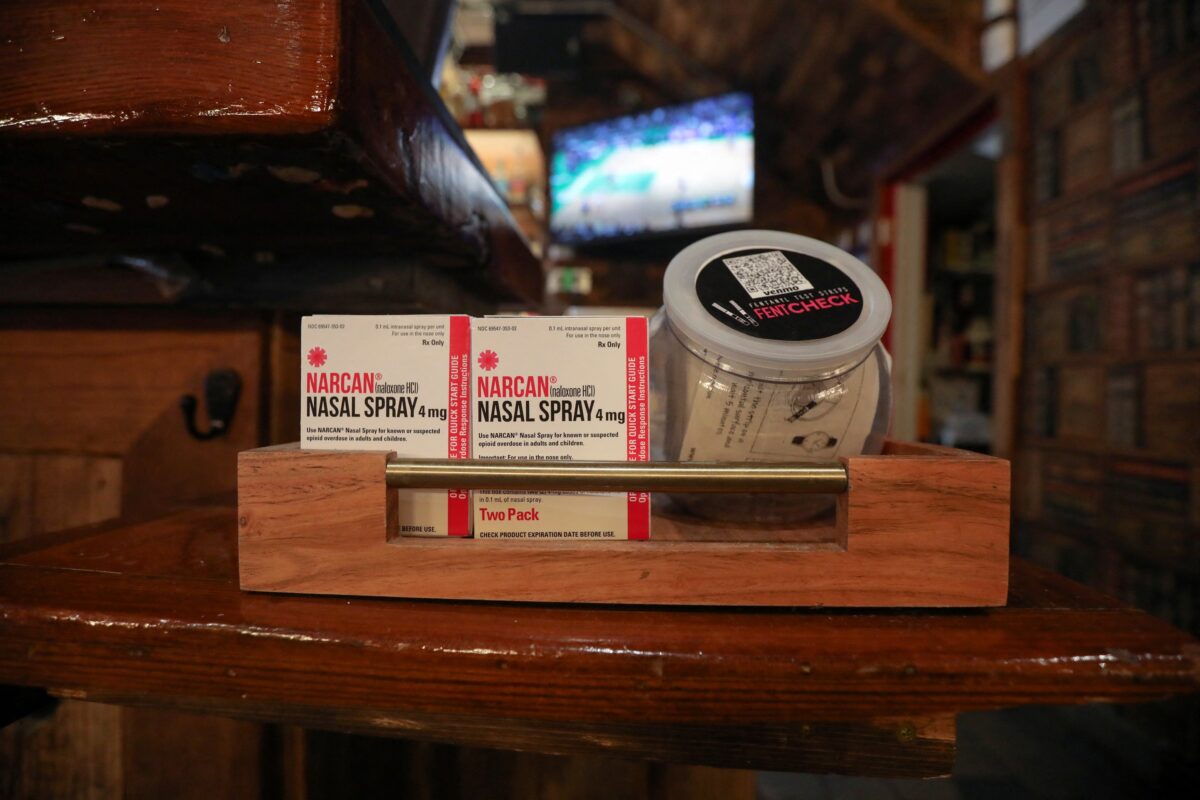


As the number of fentanyl-related deaths continues to rise, Florida joins the growing list of states moving to decriminalize the use of fentanyl test strips in an effort to save lives.
A recent report by the CDC showed that overdose deaths from synthetic opioids like fentanyl were up 15 percent nationally. Data released by Coordinated Opioid Recovery—a new statewide addiction care program implemented by a partnership with the Florida Department of Health, the Florida Department of Children and Families, and the Agency for Health Care Administration—showed that fentanyl-related deaths have increased 790 percent in Florida since 2015 (pdf).
The 2021 Annual Report released by the Florida Department of Law Enforcement/Medical Examiners Commission showed that fentanyl was involved in 6,417 deaths (pdf).
As previously reported by The Epoch Times, Dr. Kenneth Scheppke, deputy secretary for health at the Florida Department of Health, described Florida’s fentanyl crisis as a “revolving door of overdose,” saying there were over 8,000 overdose deaths in Florida in 2021. Of those, 70 percent were opioid-related. About 30 percent of those were specifically related to fentanyl.
After failing to decriminalize fentanyl test strips in 2022, the surge in fentanyl-related overdoses in Florida has since inspired state legislators to try again.
Senate Bill 164 (pdf), sponsored by Democrat Sen. Tina Scott Polsky and co-sponsored by Democrat Sen. Lori Burman, would decriminalize the use of fentanyl test strips in Florida. The measure was passed favorably by the Criminal Justice Committee on Feb. 14. A similar bill, HB 164 (pdf), sponsored by Democrat Rep. Christine Hunschofsky, is simultaneously moving through the Florida House.
States and territories where fentanyl test strips are already decriminalized include Colorado, District of Columbia, Maryland, Nebraska, New York, South Carolina, Virginia, Wyoming, California, Georgia, Illinois, Pennsylvania, Tennessee, Alabama, and Ohio. As the number of fentanyl overdose deaths continues to soar, the number of states moving to descriminalize fentanyl test strips is quickly on the rise.
A September 2022 report from the Kansas Department of Health and Environment on opioid vulnerability revealed a 73.5 percent rise in overdose deaths in Kansas between 2011 and 2020 (pdf).
After an effort in Kansas to decriminalize fentanyl test strips statewide failed in May 2022, the Wichita City Council voted in September to decriminalize the possession of the test strips within city limits. By October 2022, Kansas City Police reported another 129 fentanyl-related overdoses that included minors as well as adults, with 17 resulting in death. Four deaths, including that of a toddler, occurred within a span of 13 days, KCTV reported. On Feb. 7, legislators in Kansas introduced another bill, HB 2328 (pdf), in an effort to decriminalize the possession of test strips.
In Hawaii on Feb. 17, the state House Judiciary and Hawaiian Affairs Committee unanimously passed House Bill 573. The measure would remove fentanyl test strips from the list of what state law defines as drug paraphernalia, essentially decriminalizing possession. Next comes a vote by the full House. The Senate chamber’s Health and Human Services Committee passed Senate Bill 671 on Feb. 6 to enable the measure to move on to the Judiciary Committee. Under current state law, possession of a fentanyl test strip can result in a $500 fine.
In an effort to save lives in New Hampshire, Democrat state Reps. David Meuse and Amanda Bouldin have sponsored House Bill 470.
In Texas, Gov. Greg Abbot is reconsidering his prior opposition and is now voicing support for decriminalizing test strips.
In January 2022, the American Medical Association gave its support for the decriminalization of test strips. In June 2022, Clergy for a New Drug Policy advocated for the same. Also in 2022, Vivent Health—formerly the AIDS Resource Center of Wisconsin—anonymously distributed almost 46,000 fentanyl test strips with no questions asked, hoping people would test their drugs for the presence of fentanyl before using them. While Vivent Health is not required to file reports on the results of those test strips, over 4,600 came back positive, WBAY reported.
On May 9, 2022, the Louisiana Society of Addiction Medicine sent a letter to members of the Louisiana Senate Committee on Judiciary expressing support for a bill to decriminalize fentanyl test strips (pdf). The measure was passed on May 25, 2022, and became effective on Aug. 1, 2022.
The Centers for Disease Control and Prevention (CDC) describes fentanyl test strips as “a low-cost method of helping prevent drug overdoses and reducing harm.”
In April 2021, the CDC and the Substance Abuse and Mental Health Services Administration announced that federal funding could be used to purchase fentanyl test strips.
“We must do all we can to save lives from drug overdoses,” CDC Director Rochelle Walensky said in a statement. “The increase in drug overdose deaths related to synthetic opioids such as illicitly made fentanyl is a public health crisis that requires immediate action and novel strategies. State and local programs now have another tool to add to their on-the-ground efforts toward reducing and preventing overdoses, in particular fentanyl-related overdose deaths.”
During an interview with The Epoch Times, the Rev. Alexander Sharp, founder of Clergy for New Drug Policy, said he was “heartened by the depth of the response” that is currently happening with regard to this crisis.
“So often what you get is the reaction that you can’t do anything because it falls under the category of harm reduction,” Sharp told The Epoch Times, saying that “while it appears to be enabling” the use of drugs, “that concept is horribly misguided.”
“Drug use is out there and you want to reduce all the damage and harm you can, so we very enthusiastically support this movement,” Sharp explained. “I just wasn’t really aware until now that there was this kind of ‘Hail Mary’ activity towards it.”
Sharp noted the existence of “safe consumption sites,” where people can go to use their drugs under medical supervision. Sharp said these are common in Europe and that there are three such sites in New York City.
However, Sharp noted how society still views programs like this as something that will only facilitate the use of drugs.
“That’s very often the reaction you’re going to get, that you’re enabling drug use if you have anything that speaks to reducing the harm of drug use,” he explained, asserting that “people can’t make that distinction. But that’s the distinction that needs to be made.”
Someone who works with Sharp understands firsthand the depths to which an opioid addiction can drag someone down.
“I think it’s incredibly encouraging to see these steps forward in understanding that the overdose crisis is a public health issue and needs a public health response,” Timothy McMahan King told The Epoch Times.
King, a senior fellow with Clergy for a New Drug Policy, was hospitalized in 2009 for an extended period of time and placed on heavy doses of opioid pain medication. As with many who have been prescribed opioids as a form of treatment, King developed an opioid addiction. His experience inspired him to write a book, Addiction Nation, which came out in 2019. However, King was quick to note the drastic and deadly difference between consuming opioids prescribed through a doctor’s prescription and consuming opioids obtained from unknown sources.
“I was on heavy doses of fentanyl pain medication. But when I was on it, it was through prescriptions. So I wasn’t in danger of overdose death because I knew what I was taking and I knew how much I was taking,” King explained, noting that fentanyl is safely used during labor and delivery in pregnant women.
“What we’re seeing today is a poisoned drug supply in which people don’t know what they are using or how much they are using, which results in these overdoses, and it doesn’t need to be this way,” King insisted. “It’s just a lot more dangerous than it used to be. So we can simultaneously discourage dangerous drug use and try to keep people as safe as possible when they’re in the midst of addiction. That’s what is so promising about these steps in moving forward.”
He also commended the current “increased bipartisan acknowledgment that we are facing a public health crisis,” adding that “we desperately need bipartisan cooperation solutions.”
“It’s a movement from saying ‘this is a problem that we need to punish,’ to saying ‘this is a health challenge we need to meet,'” King clarified, explaining that “addiction is defined by persistence in a behavior, despite the negative consequences.”
“Simply increasing negative consequences doesn’t understand the nature of addiction,” King said. “That’s where we need these public health approaches that understand and have compassion toward people and that’s the greatest step forward we can take right now. If simply punishing people more would have worked, we would have been out of this crisis by now.”


